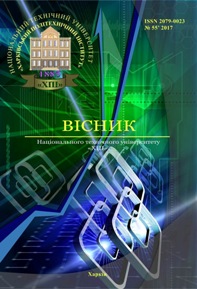Integrated information system assessment of complex objects safety level
DOI:
https://doi.org/10.20998/2079-0023.2017.55.07Keywords:
environmental safety, methods of system analysis, mathematic modeling methods, information monitoring systems, safety state identification, environmental knowledge-oriented systems, information program of systems quality assessmentAbstract
The complex methodological approaches for solving problem tasks objects quality assessment are determined on the basis of system analysis means combination and of the information and software complex development of research data processing with use of modern mean knowledge providing. Methodological support is based on theoretical knowledge in field of information entropy theory, synergetic, knowledge-oriented databases development; information space of integrating entities unity principles. The scientific and practical foundations of methodological and informationalsupport for the determination of complex systems state assessment and their functional capabilities, safety level of the investigated objects, using of knowledge-oriented information systems for obtaining knowledge on the research objects results at level “state (system –environment) – change – process – system state”. The generalized algorithmic approach from complex system object analysis as integrity having its microstructure to which it is proposed to attribute not only component components and elements, but also processes of its functioning is developed. Practical implementation of the proposed informational and methodological approaches for complex systems study analysis on the entropy-information basis is shown on the results of quality and safety functioning assessment of natural-technological, ecological-economic systems, providing operational control and safety management of technological processes.References
Klir Dzh. Sistemologija. Avtomatizacija reshenija sistemnyh zadach [Systemology. Automatization of system problem solving]. Moscow, Radio i svjaz'. 1990, 540 p.
Zhurovs'kyy M.Z., Pankratova N. D. Osnovy systemnoho analizu [System analyses foundations]. Kiev, Vydavnycha hrupa BHV. 2007, 544 p.
Kozulya M. M. Informatsiyno-prohramne zabezpechennya realizatsiyi systemnykh metodiv vyznachennya stanu skladnykh system [Information software for the system methods implementation for determining complex systems state]. Materialy V Vseukrayins'koyi naukovo-praktychnoyi konferentsiyi «Intelektual'ni systemy ta prykladna linhvistyka». Kharkov, NTU «KhPI», 2016, pp. 46–47.
Kozulia M. M. Znannya-oriyentovana kompleksna metodyka otsinky stanu skladnykh system [Knowledge-based comprehensive methodology of complex systems state assessment]. Visnyk NTU «KhPI» Seriya: Innovatsiyni doslidzhennya u naukovykh robotakh studentiv [Bulletin of National Technical University «KhPI». Series: Innovation researches in students’ scientific work]. Kharkov, NTU «KhPI», 2016, no. 19 (1191), pp. 39–44.
Kasimov O. M. Kozulia T. V., Haharin V. V., Yemel'yanova D. I., Kozulia M. M. Metody i model' systemy kompleksnoho otsinyuvannya ekolohichnoho stanu pryrodno-tekhnohennykh terytoriy [Methods and model of integrated assessment system of of natural and man-made territories ecological state]. Ekolohyya y promishlennost'. 2013, no. 1, pp. 21–27.
Kozulia T. V., Sharonova N. V., Kozulia M. M., Svyatkyn Ya. V. Formuvannya znan'-oriyentovanykh baz danykh dlya vyznachennya kompleksnoyi metodyky identyfikatsiyi yakosti skladnykh system [Knowledge-oriented databases formation for definition complex method quality identification of compound systems]. Vostochnoevropeyskyy zhurnal peredovikh tekhnolohyy. 2016, no. 1/2 (79), pp. 13–21.
Vechirs'ka I. D., Shabanov-Kushnarenko Yu. P. Pro doslidzhennya vlastyvostey liniynykh lohichnykh peretvoren' [Study about linear logic transformations properties]. Systemy obrobky informatsiyi. 2007, Vol. 8 (66), pp. 130–133.
Kolmogorov A. N. Teorija informacii i teorija algoritmov [Information and algorithms theory]. Moscow. Nauka, 1987, 304 p.
Kozulia T. V., Myasoedov V. V., Shcherban' M. H., Kozulia M. M. Kompleksna ekoloho-hihiyenichna otsinka stanu antropohennonavantazhenykh terytoriy za kontseptsiyeyu korporatsiynoyi ekoloho-hihiyenichnoyi systemy [Comprehensive ecological and hygienic assessment of anthropogenic-loaded territories state by ecological-hygienic system corporation concept]. Radioelektronika ta informatyka. 2012, no. 2 (57), pp. 75–82.
Kasimov O. M., Kozulia T. V., Yemel'yanova D. I., Kozulia M. M., Haharin V. V. Kontseptsiya kompleksnoyi otsinky systemnykh ob"yektiv pryrodno-tekhnohennykh i landshaftno-heokhimichnykh kompleksiv [Conception of complex estimation methodology of ecological compatibility for territorial and object systems]. Vostochnoevropejskij zhurnal peredovyh tehnologij. Kharkov, 2012, no. 4/4 (58), pp. 62–68.
Sharonova N. V., Kozulia M. M. Entropiyna otsinka faktoriv vyznachennya stupenyu khvoroby y hrup zakhvoryuvannya [An entropy evaluation of factors determining disease and disease groups degree]. Sistemnyj analiz i informacionnye tehnologii: materialy 15-j Mezhdunarodnoj nauchno-tehnicheskoj konferencii SAIT-2013. – Kiev : UNK «IPSA» NTUU «KPI», 2013, pp. 218–220.
Kozulia M. M. Rozrobka prohramnoho zabezpechennya rozrakhunku sotsial'no-ekolohichnykh pokaznykiv yakosti [Software development for calculating social and environmental quality indicators]. Information technologies in information business conference (ITIB). Kharkov, 2015, pp. 10–11.
Moyisyeyev V. F., Kozulia M. M. Prohramna pidtrymka entropiynoinformatsiynoyi otsinky vidpovidnosti stanu skladnykh system [Software support for entropy-informational assessment of complex systems state conformity]. Sistemnyj analiz i informacionnye tehnologii: materialy 18-j Mezhdunarodnoj nauchno-tehnicheskoj konferencii SAIT-2017. – Kiev : UNK «IPSA» NTUU «KPI», 2017, pp. 178–179.
Downloads
Published
How to Cite
Issue
Section
License
Copyright (c) 2018 Bulletin of NTU “Kharkiv Polytechnic Institute”. Series: System Analysis, Control and Information TechnologiesAuthors who publish with this journal agree to the following terms:
- Authors retain copyright and grant the journal right of first publication with the work simultaneously licensed under a Creative Commons Attribution License that allows others to share the work with an acknowledgement of the work's authorship and initial publication in this journal.
- Authors are able to enter into separate, additional contractual arrangements for the non-exclusive distribution of the journal's published version of the work (e.g., post it to an institutional repository or publish it in a book), with an acknowledgement of its initial publication in this journal.
- Authors are permitted and encouraged to post their work online (e.g., in institutional repositories or on their website) prior to and during the submission process, as it can lead to productive exchanges, as well as earlier and greater citation of published work (See The Effect of Open Access).


